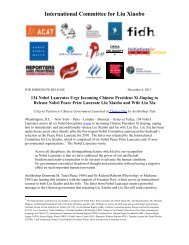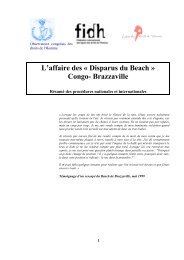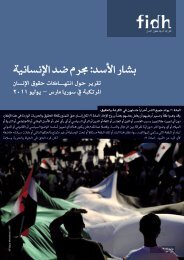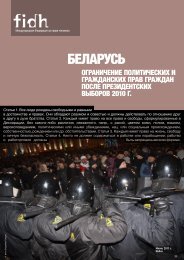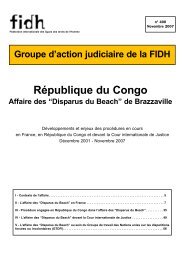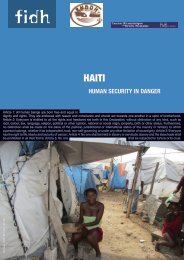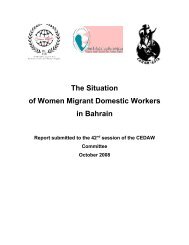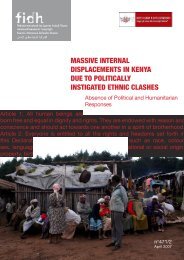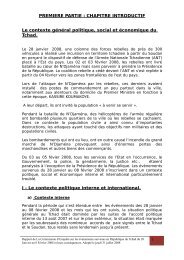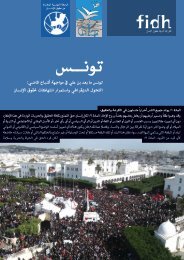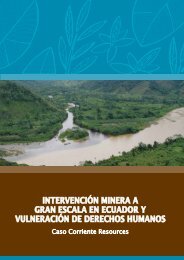Create successful ePaper yourself
Turn your PDF publications into a flip-book with our unique Google optimized e-Paper software.
a Ghanaian friend who was beaten and robbed. We are accused of being pro-Gaddafi. MySyrian boss <strong>to</strong>ld me that I had <strong>to</strong> leave <strong>Libya</strong>. I had a good job.”J., Liberia, 40 years old, 5 years in <strong>Libya</strong>, welder, lived in Tobruk“One day I was in a shop with a friend when some <strong>Libya</strong>n men approached us and <strong>to</strong>ld us <strong>to</strong>follow them <strong>to</strong> an office. There they accused us of being pro-Gaddafi; they <strong>to</strong>ok our phoneand locked us up. They brought reporters <strong>to</strong> tell them we were mercenaries, but we deniedthis and they became very aggressive. They threatened <strong>to</strong> kill us and we stayed locked up for7 days. In the end, a London journalist alerted the Red Cross who came and got us out.”E., Eritrea, in <strong>Libya</strong> 3 years, welder, worked in Benghazi for 4 monthsBecause of racketeering at checkpoints, exiles now prefer <strong>to</strong> take the Red Cross bus <strong>to</strong> theborder. A Nigerian man who arrived on 9 May in Salloum <strong>to</strong>ld the delegation: “I went <strong>to</strong> registerwith the Red Cross in Benghazi and waited three days for a bus <strong>to</strong> the border. It’s <strong>to</strong>o dangerous<strong>to</strong> travel alone as a black African. We arrived here yesterday, with 43 others, on a Red Crossbus. We had no problems on the way and we arrived with all our luggage.”- Dismissal <strong>from</strong> work without paymentMany of those met by the <strong>FIDH</strong> delegation reported that they had been sent away <strong>from</strong> theirjobs without being paid. The delegation met with two groups of Chadian men working on farmsor with camels for <strong>Libya</strong>n men in the Benghazi area. The following account summarizes theexperience of these groups:“We heard s<strong>to</strong>ries of mercenaries on the radio and that among them there were Chadians.From then on, our boss started <strong>to</strong> mistreat us, accusing us of wanting <strong>to</strong> kill <strong>Libya</strong>ns. We<strong>to</strong>ld him we were just workers coming here <strong>to</strong> earn money, but he didn’t believe us anddismissed us without paying us our wages. We do not have passports or work permits.Many Chadians in <strong>Libya</strong> don’t have any papers.”K., Chadian, 30 years old, in <strong>Libya</strong> for 2 years, keeper of camels (“camel boy”) for a<strong>Libya</strong>n man in the region of BenghaziThese men <strong>to</strong>ld the <strong>FIDH</strong> delegation that they were paid every 4 <strong>to</strong> 6 months and that theyhad thus been sent away without several months pay. They reported that there were still manyChadians in <strong>Libya</strong> who would not leave until they were paid their salaries. These testimonieswere confirmed <strong>to</strong> the delegation by an IOM employee, who said they had witnessed the arrivalof groups of Chadians who had nothing at all, just the clothes on their backs.3. What justice for victims?The evidence gathered by the <strong>FIDH</strong> mission points <strong>to</strong> widespread and systematic abuses andracially motivated violence targeting Sub-Saharan Africans in Eastern <strong>Libya</strong>.These allegations of grave violations of human rights go almost systematically uninvestigatedin <strong>Libya</strong> and impunity reigns. These abuses are not only crimes under national law in <strong>Libya</strong>, butalso amount <strong>to</strong> grave violations of international human rights and humanitarian law, as enshrinedin international conventions ratified by <strong>Libya</strong>, including the International Covenant on Civiland Political Rights, the Convention on the Elimination of All Forms of Racial Discrimination,the Convention on the Protection of the Rights of All Migrant Workers and Members of theirFamilies, the four Geneva Conventions and Pro<strong>to</strong>col II <strong>to</strong> the Geneva Conventions relating <strong>to</strong>the Protection of Victims of Non-International Armed Conflicts, <strong>to</strong> which <strong>Libya</strong> is party, as wellas under cus<strong>to</strong>mary international humanitarian law. They may also amount <strong>to</strong> war crimes and assuch fall within the jurisdiction of the International Criminal Court (ICC).<strong>FIDH</strong> – EXILES FROM LIBYA FLEE TO EGYPT / 17




